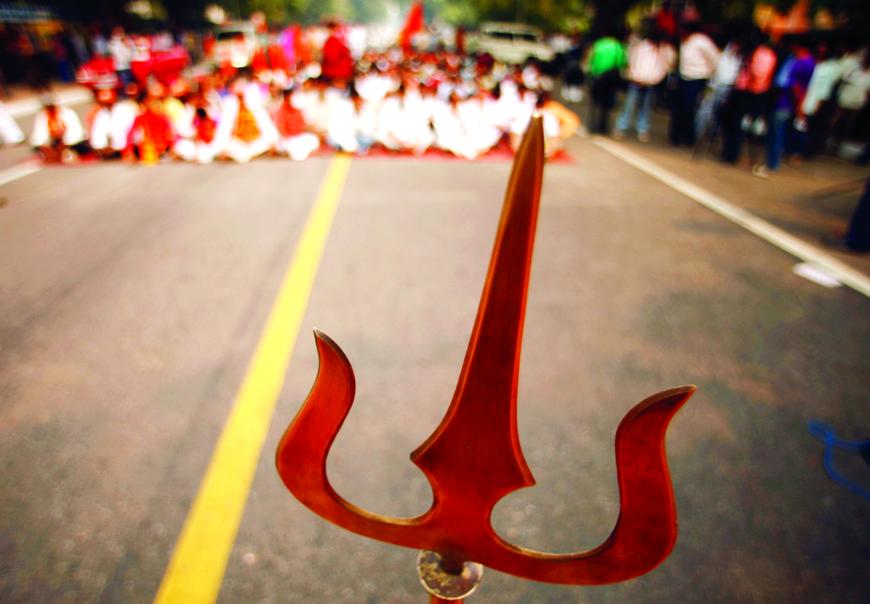Brahmanism Versus Bahujanism

Representational Image. Image Courtesy: Countercurrents
Before any social imagination can become hegemonic, two conjoined aspects must establish themselves in society. The primary precondition for hegemony is a social power which is inextricably intertwined with moral universality. Social power is required to fulfil material needs that can enable social and economic mobility and redistribute resources, and to control positions of decision-making. But to sustain this control social power also needs to emerge as a morally potent force that appeals to the majority while undermining all contesting social imaginations.
Hindutva politics is essentially a rebooted and modernised version of Brahmanism. It projects itself as a de-Brahmanised Hinduisation process in which a large number of caste groups are being provided representation, while actually restoring the existing social inequalities. Hindutva is presenting an inclusive identity of being Hindu even if in concrete terms it provides only graded inclusion and not necessarily equality. Samrasta, as the RSS argues, means social co-habitation without equality. As the RSS chief Mohan Bhagwat has said, we need a “harmonious debate” on reservations, which he essentially said would help maintain “unity” and “brotherhood” among Hindus.
Unity and brotherhood are universal values that hold a moral appeal and one cannot easily argue that they are dispensable. Reservations need to be rethought, as far as the Sangh is concerned, for it is creating divisions and conflicts, which are not good for society. In fact, the RSS could even have argued that reservation creates misrecognition and stigma and therefore better modes of mobility need to be conceived of. This, in turn, would make it good to achieve “Hinduness” and “Hindu swabhiman”.
The RSS does not hesitate to argue that caste is the enemy of Hinduism created by foreign intruders. The important point here is that the RSS is laying claim to a universal fraternity and nationalist unity, and undermining conflict and divisions, which cannot per se be celebrated as cherished values, even if many think they are necessary to achieve mobility for marginalised groups. In the current context of faceless globalisation, a social imagination that conceives of unity and cultural inclusion is turning out to be a potent imagination making superior moral claims. This is a precondition for hegemony.
In 1948, BR Ambedkar explained the historical conflict between Brahmanism and Buddhism, and how the former gained moral supremacy over Buddhism by converting being beef-eaters into vegetarianism. He argued that the Buddhists opposed the sacrifice of cows and thereby gained moral superiority in an agrarian society, but in order to dislodge them, the Brahmins took to vegetarianism. Ambedkar says in Beef, Brahmins and Broken Men, “They wanted to oust the Buddhists from the place of honour and respect which they had acquired in the minds of the masses by their opposition to the killing of the cow for sacrificial purposes. To achieve their purpose the Brahmins had to adopt the usual tactics of a reckless adventurer. It is to beat extremism with extremism. It is the strategy which all rightists use to overcome the leftists. The only way to beat the Buddhists was to go a step further and be vegetarians.”
The counter-revolution performed by Brahmanism lasted a few centuries before Ambedkar organised yet another revolution through the modern State, Constitutionalism and legal-rational authority. Today, with the ascendancy of the Right, one could argue that Brahmanism is performing yet another counter-revolution, and once again gaining ascendancy by ousting Bahujanism by laying a claim to universal values of unity, universal brotherhood and community. As Ambedkar pointed out, the change to vegetarianism was not out of conviction but was pursued as a strategy to gain supremacy.
He says, “To my mind, it was strategy which made the Brahmins give up beef-eating and start worshipping the cow. The clue to the worship of the cow is to be found in the struggle between Buddhism and Brahmanism and the means adopted by Brahmanism to establish its supremacy over Buddhism.” Today, Brahmanism as Hindutva is being made to look inclusive as a strategy and laying claims to a universality that speaks to diverse social groups, whose members it is “presenting” an opportunity to seek inclusion and mobility.
Yet again there is need for a social revolution. In today’s context, one had expected Bahujanism to perform a revolution against the ongoing counter-revolution. For a revolution, Bahujanism will need both social power and the moral imagination of a normative project that can make claims of universal inclusion and which is morally superior to the kind of inclusion that Brahmanism is offering in the shape of cultural nationalism and resurrected Hinduness.
However, though Bahujanism is acutely aware of the need for social power to counter Brahmanism, yet it has consistently moved away from offering universal normativity as Buddhism had sought to do. Today’s Bahujanism is, in fact, laying a claim to social power through assertion for representation in the language of exclusivity.
Current Bahujanism has succeeded to a great extent in demonstrating structural injustice and discrimination in the way caste continues to exclude. But it has failed to offer an alternative philosophy that is morally superior, more inclusive and humane, and has the ability to enrich social life and its meanings. A morally superior world-view has to include even those who are occupying “superior” locations in the caste order to argue why and how even they could expect a more meaningful social life of compassion and self-discovery which are not possible under Brahmanism. It is here that Bahujanism has traded social power for moral universality instead of finding new ways of combining the two.
Assertion for social power without universal normative claims is singularly self-defeating. Current Bahujanism has made exclusivist claims for social mobility and it would therefore find it difficult to face the moral vision presented by cultural nationalism. It has consistently moved towards a self-imposed tunnel vision that can be seen in its inability to defend even “moral exemplars” such as Anand Teltumbde and by declaring them Brahmanical. There may well be disagreements, but underlying solidarity cannot be completely undermined. Further, the irreconcilable differences they have with the progressive and more democratic “upper caste” intellectuals-activists is yet another nail in the coffin of revolution.
Legitimate criticism and the possibility of appropriation of agenda are welcome, along with opportunities to forge larger solidarities, but what we have instead are mutually exclusive world-views that are amenable to Brahmanical appropriation. What we need in order to resist the ongoing counter-revolution is a philosophy of solidarity with differences that can oppose the innate sectarianism of Brahmanism.
The author is associate professor, JNU. He edited Secular Sectarianism, published by Sage in 2019. The views are personal.
Get the latest reports & analysis with people's perspective on Protests, movements & deep analytical videos, discussions of the current affairs in your Telegram app. Subscribe to NewsClick's Telegram channel & get Real-Time updates on stories, as they get published on our website.
























